Goodbyepublished at 19:05 GMT 23 January 2023
That's it for our live coverage, thanks for following along.
Today's page was written by Sam Hancock, Thomas Mackintosh and Faarea Masud. It was edited by Jeremy Gahagan.
Up to a million households in England, Scotland and Wales have an hour to reduce their electricity use (from 5pm until 6pm) to get discounts off their energy bills
We're hearing from people who've signed up to the National Grid scheme, as they do things like delay using their washing machine or oven
And our business correspondent Theo Leggett is answering your questions on energy saving
People in England, Scotland and Wales who have a smart meter are eligible to take part in the project
Delaying use of ovens, washing machines or charging electric vehicles will all have an impact
Meanwhile, this week's cold snap is expected to lead to high power demand, while wind power is forecast to be lower than usual
Edited by Jeremy Gahagan
That's it for our live coverage, thanks for following along.
Today's page was written by Sam Hancock, Thomas Mackintosh and Faarea Masud. It was edited by Jeremy Gahagan.
We're going to close this page shortly but first, let's take stock of what's been happening today.
First energy-saving scheme rollout: Outside of trials, today marked the first time some energy customers could earn money for cutting back on the electricity they used.
How it works: Officially dubbed the Demand Flexibility Service, external, it sees energy suppliers pay customers a small bonus if they use less electricity than usual, at a particular time (today was between 17:00 and 18:00 GMT). The money earned is then taken off a customer's bill.
People who can partake: You must have an electricity smart meter installed and be with a provider signed up to the scheme, external (there are 26 in total, including British Gas and E.ON Next). Providers must also offer you the chance to take part.
User experience: Some of our readers, who took part in today's session, documented their experience. You can catch up on their stories by scrolling down.
What happens next... There'll be another energy-saving session tomorrow, which is due to last for an hour and a half (between 16:30 and 18:00). We're yet to hear details about more dates.
For more information, including how much of a discount can be made, read our main story.
There's been lots of talk about the energy price cap since bills began rising last year.
This came to a head when former PM Liz Truss announced she would ensure the average UK household paid no more than £2,500 a year - a policy that the government swiftly backtracked on.
Help will now be less generous from April, with bills for a typical household going up to £3,000, as announced by Chancellor Jeremy Hunt. But there will be more support for the most vulnerable, including:
Previously, the energy regulator Ofgem set the maximum suppliers could charge households per unit of energy.
But after prices soared in the wake of Russia's invasion of Ukraine, the government announced its price guarantee would replace this energy cap, external.
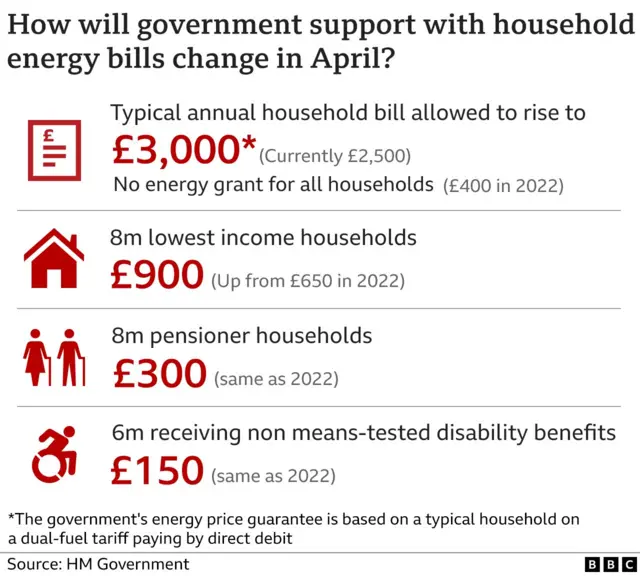 Image source, .
Image source, .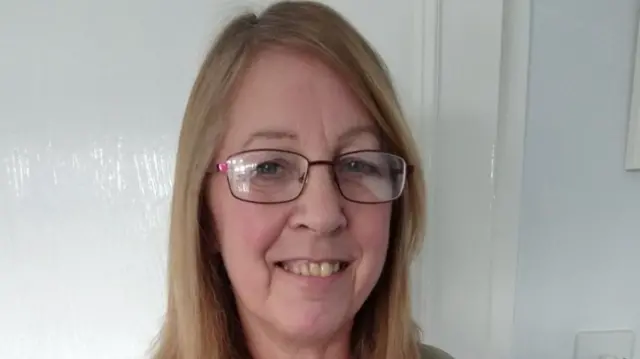 Image source, Denise Hutchinson
Image source, Denise HutchinsonDenise Hutchinson, 64, from Oldham wishes she could participate in energy-saving schemes by suppliers.
She was told that since she does not have a smart meter, she does not qualify for a discount on her bills for reduced usage at peak times.
"I am using my oven a lot less these days. It would be handy to check in on my energy usage, and see which utilities use the most. We would like to save money too, of course.
"We have been told that because we have a meter for our solar panels there is not enough room in the cupboard for a smart meter - so will not be able to get the discount," Denise adds.
Cost-saving schemes such as this one remind us of a key issue this winter: many people are struggling with the cost of heating and other home energy bills.
Here are five ways to help keep costs down:
While the actual savings differ for different people, we've explained here how the figures above were calculated.
Lucy Hooker
Business reporter
I’ve just boiled my own kettle to try to get some idea.
It is a 3kw Dualit Classic - so would use 3kwh (think of that as three units of energy) if you boiled it for an hour.
It took two-and-a-half minutes to boil one litre of water - plenty for a round of tea for all the family.
So the energy it used is 2.5/60 x 3kwh = 0.125 of a kwh used.
If I didn’t boil that kettle full of water - forgoing a round of hot drinks for the family - EDF, which is paying £3 per kwh saved, would pay me 37.5p.
Sam Hancock
Live reporter
As we've been reporting, Amanda and her family chose to go on a bike ride while they were limited in what they could and couldn't turn on at home.
She says the entire experience was a "great excuse to get out for an hour and get some exercise while saving energy and money".
"It's a win win," she tells me, alongside an image of her family arriving home.
"I'd encourage everyone to give it a go," Amanda says of the energy-saving scheme.
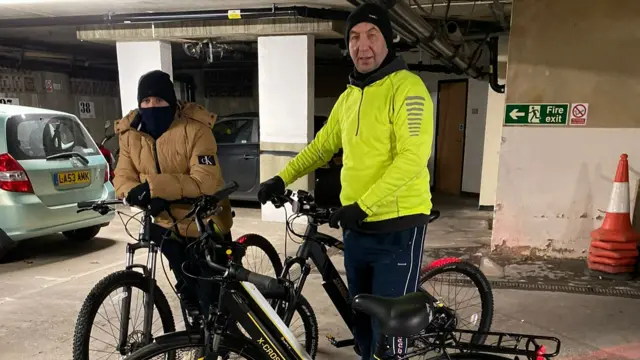 Image source, Amanda Boorah
Image source, Amanda BoorahIt's also time to hear what Bob and Amanda - our readers who've been updating us on their energy-saving hour - have to say about the experience.
Bob says he won't go as far as saying it's "back to normal" now that it's past 18:00, because "it has been normal" throughout - just a little more "planning around our usage today".
Some thought should be given on getting more families with children onto the scheme, he says. "They are the future and can change the attitudes of their parents."
He adds that he's looking forward to those free units of electricity - and hopes we've managed to avoid the use of coal generation.
"Perhaps time for another cuppa" now, he says.
Sam Hancock
Live reporter
Tara says, overall, she doesn't mind taking part in these sessions.
"It was only an hour," she tells me, adding she'll gladly do the same again tomorrow.
"I'm happy to help in any way I can," Tara adds.
Oliver Smith
Senior business producer, BBC News
Energy firm EDF says thousands of its customers took part in tonight’s scheme.
It says the 34,000 consumers who are signed up will have the savings credited to their bills within two weeks.
However, it cautions no new customers can sign up as it’s currently invite-only.

 Theo Leggett
Theo Leggett
BBC Business Correspondent
The final question comes from Barbara Reade in Fife who believes it's a token gesture and one of the most unlikely times to be using your washing machine or oven. Does it to apply to all appliances?
The idea is that your supplier pays you to reduce your electricity usage, compared to what you would normally use, at a specific time of day.
This is done to reduce demand at times when the grid is under the most strain.
Your supplier will set you a target for reducing your consumption.
Some appliances use a lot more energy than others. Washing machines, ovens, dishwashers, hair dryers and immersion heaters are relatively power hungry; phones and laptops are not.
So to meet the target you will need to focus on the power-hungry devices.
This doesn’t mean you have to use less energy overall – you just have to change the time of day you’re using it.

 Theo Leggett
Theo Leggett
BBC Business Correspondent
We've a couple more questions to cover now, thanks for all your contributions.
The penultimate one comes from Lindsay Chidlow from Shrewsbury who asks, if those taking part in the scheme are using more power before and after the hour, there will be an increase of power and they will not make a saving?
The point of the scheme is not to reduce electricity consumption, but to reduce strain on the grid at peak times – when people are coming home from work and cooking dinner in the evening for example.
So if you decide to use your washing machine or dishwasher at 8pm rather than 5pm, you are doing exactly what your supplier wants you to do.
Essentially, you aren’t being told not to use your appliances, just to use them at a different time.
If you do that, you’ll get the discount – provided you’re signed up to the scheme.
It's past 6pm, which means that's it for today's energy-saving hour.
Customers who signed up to the scheme are now free to go about using their appliances as normal.
We're going to be hearing how our readers, who've been sharing their experience, found it - stay tuned.
Sam Hancock
BBC News Live reporter
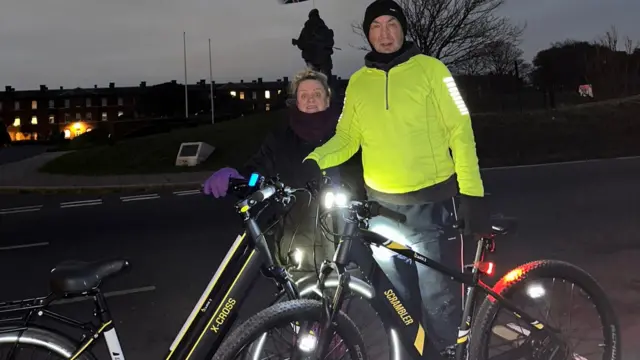 Image source, Amanda Boorah
Image source, Amanda BoorahI've had this image from Amanda, who we've been hearing from.
She says of her family's bike ride: "Using energy, the right sort!"
We're due to hear how she and her family found the scheme soon.
Suzanne Murray, an NHS administrator from Southampton, says she will be taking part in the scheme with E.ON today although she doesn't know why they bother as "there is no discount on bills to be gained."
She says: "E.ON have told me that if I hit my target of 20% reduction... I could earn around 5p.
"That's not worth it! I feel like turning all the lights on in the house, the whole lot, and just burning power!
"Seriously, it makes no sense."
She says she switches off all devices on standby daily, and regularly participates in these energy-saving schemes, but adds if firms could take off around £20 extra from a monthly bill, it might be worth it for larger families.
Tara's been in touch again.
She says that since today's session began, she's had an email from her supplier, British Gas, asking if she'd like to get involved in the scheme again tomorrow.
"You get a text to check your emails, then click on a link and sign up," she explains.
"You don't have to if it's inconvenient," Tara says, adding she doesn't mind doing it "if it helps others".
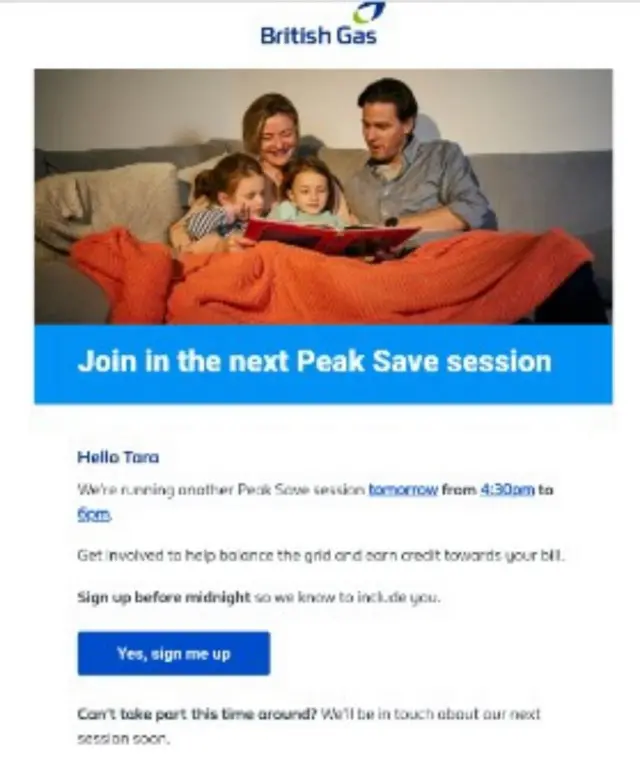 Image source, Tara Pownall
Image source, Tara PownallA screenshot of Tara's invite from British Gas
Sam Hancock
Live reporter
We're just over halfway through today's energy-saving hour.
"No issues so far," Bob tells me, adding he and his wife have simply "turned off" the appliances they aren't using.
"I guess it all helps - even all those normally on standby must make a small saving," he says.
Referring to his remarks earlier - that savings are small in these sessions - he says he's now realised that tonight, for every unit of electricity saved they "get paid for 10 more".
"So that’s worth having," Bob adds.

 Theo Leggett
Theo Leggett
BBC Business Correspondent
Back to our questions - one reader asks how many suppliers have signed up to this scheme?
According to National Grid, 26 suppliers have signed up to the scheme so far.
They include major domestic suppliers such as EDF, E.ON, Ovo Energy and Octopus Energy, as well as a number of others that only supply businesses.
Around a million households and companies are involved.
Sam Hancock
BBC News Live reporter
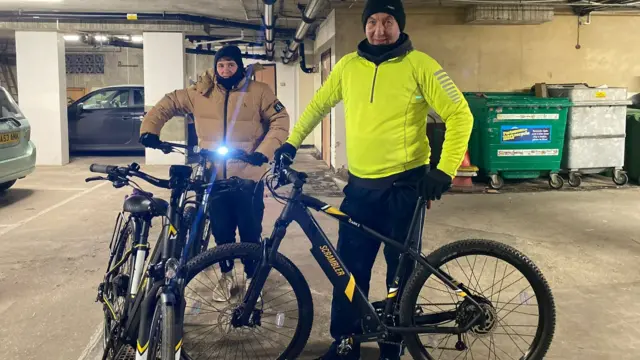 Image source, Amanda Boorah
Image source, Amanda BoorahLet's hear from another of our readers who's keeping us up to date with their energy-saving hour.
Amanda, who we said earlier was planning to go off on a bike ride during this time, has sent us a photo of her family ready to leave.
"We're just setting out on the bikes," she says, adding it's a nice feeling knowing they'll be getting some exercise in while "saving money too".
She promises to send us a photo of the seaside, too.
Sam Hancock
Live reporter
It's time to hear from Tara now, who appeared on the page a little earlier.
At the beginning of the hour, she says this is the time she'd "normally be doing washing" when she gets in from work.
"I'm off today, though, so I did it earlier," she says.
She'll start making dinner at 18:00 GMT, she tells us, as by then she'll be free to use her cooker.